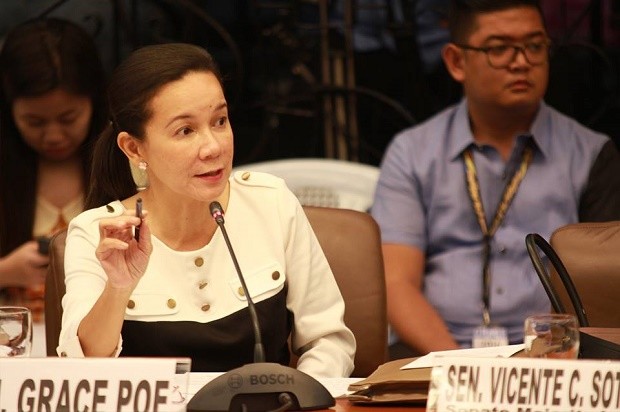Senate panel to reopen hearings on emergency powers—Poe
Upon the request of some senators, the Senate committee on public services will reopen its public hearing on a bill seeking to grant President Rodrigo Duterte emergency powers to address the traffic crisis in the country, Senator Grace Poe said on Tuesday.
Poe, who chairs the committee, said the fourth public hearing will be held on October 12 also in a bid to further clarify the government’s plan to implement “critical transportation projects.”
The senator earlier announced that its third public hearing on September 22 would be its last although the committee will still hold technical working group meetings towards crafting a committee report on the measure.
READ: Poe panel ends public hearings on emergency powers
“In the interest of transparency, and as requested by the Minority Leader, we will be conducting a fourth hearing to give the DOTr an opportunity to present in detail how they plan to implement certain projects and an opportunity to explain why some of their projects, which apparently have nothing to do with traffic decongestion, are included in their proposals,” said Poe at the European Union (EU)-Philippines Business Summit transport forum organized by the EU and the European Chamber of Commerce of the Philippines.
Article continues after this advertisementShe was referring to Senate Minority Leader Ralph Recto. DOTr is Department of Transportation.
Article continues after this advertisementFor one, Poe said, the committee would like to be apprised on two proposed bus rapid transit system projects—one that would traverse Manila City Hall to Quezon City and another from Edsa to Ayala and Ortigas to Ninoy Aquino International Airport (Naia).
Based on the DOTr’s submissions, the projects would cost the government about P44.23 billion, which are expected to be implemented in three years with the extra powers.
Poe said the committee would also want to be clarified why the proposed list of port projects submitted by the DOTr to the Senate only included Manila ports and did not include any proposed project for Subic and Batangas ports.
“Our traffic problems are by no means confined to land-based transportation. We also have to deal with port congestion resulting in slower movement of goods by sea, and air traffic problems causing flight delays,”she said.
”It is incumbent upon us to extensively scrutinize the DOTr’s plans to ensure that these will have direct impact on the alleviation of transport woes,” Poe told the forum.
The senator acknowledged that traffic situation had already impaired workers’ productivity and left irreversible impacts on health and the economy.
The Japan International Cooperation Agency has estimated that the daily gridlock cost the economy approximately P2.4 billion in 2012 and that losses could worsen to P6 billion by 2030 if the government fails to provide immediate relief to motorists and commuters.
“If I could describe the traffic problem in the Philippines in word it is this: Paralysis. Traffic paralyzes us. It is no wonder that we lose approximately P3 billion a day, with Metro Manila residents spending 1,000 hours a year in traffic, while other countries in the world spend only 300 hours,” Poe said
She acknowledged that traffic had already impaired workers’ productivity and left “irreversible impacts” on health and the economy.
“Like our countrymen, I too, wish to experience an improved transportation system within my lifetime,” said the senator. RAM/rga
